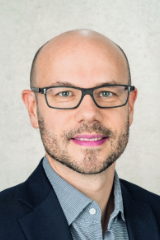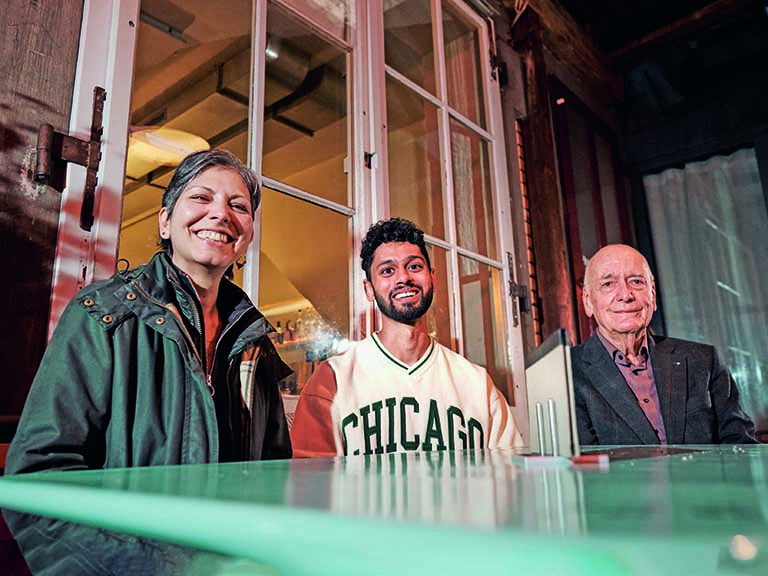Studies and career choice
"A career is a dynamic process that can be shaped".
A university education alone is rarely a ticket to a successful career start: You also require a flexible career plan, career skills, proactivity and a willingness to constantly learn new things, says Andreas Hirschi, Professor of Occupational and Organizational Psychology.

Andreas Hirschi: This should be addressed on an ongoing basis – preferably as early as at high school. Especially since choosing a course of study is a provisional choice of career and defines a direction. Ideally, you start your studies with an idea of the professions you are interested in. The earlier students deal with this topic, the better.
In your opinion, is it necessary to develop a career plan and what should this plan take into account?Today, the idea is that you don’t necessarily have to have a career plan for the next ten or even twenty years, especially because the future is unpredictable. But it is worth knowing an approximate direction that can be broken down into mini-plans. It is important to consider what would be useful next steps for the planned path in order to achieve the desired objectives.
Studying in snapshots
The cover picture of this article first appeared as part of the picture series in uniFOKUS, the print magazine of the University of Bern. Five students from the University of Bern captured everyday moments of their student life with an Instax camera. The pictures were curated and arranged by our photographer Dres Hubacher. The resulting photo series takes a unique look at the topics featured in the magazine.
Gaining experience is always beneficial. Whether before or during your studies. An important part of career planning is that you are able to assess yourself and your professional field well. For both, I need knowledge from the world of work. Self-assessment is based on self-reflection, but without experience I can’t see what I’m good at and what I like. I can only make a sound assessment of professions and working environments if I have experienced them myself.
What do you need to consider if you have the opportunity to complete an internship during your studies?It should be a learning opportunity and should be chosen accordingly. Does the internship allow me to carry out different activities? Can I get an insight into the field I am interested in and its various areas? The choice should therefore focus on the learning effect and the breadth of the learning experiences. Another important aspect of internships is networking.
“I can only make a sound assessment of professions and working environments if I have experienced them myself.
”
Andreas Hirschi
How do students manage to design their career plans flexibly in order to prepare for different career scenarios?In this regard, it is certainly helpful to orient yourself as much as possible to your own values: What is important to me? How do I actually want to work? It is also essential that you set your own milestones. To this end, you should check at regular intervals whether the set objectives are still appropriate. Especially as you cannot rule out the possibility that other wishes for the future may have arisen in the meantime. As a result, you should remain as flexible as possible and not stick to your original career plans at all costs.
What career skills should students acquire to prepare for a successful career?There are four areas of competences you should have that help you make your career as successful as possible: First of all, there is the ability to set goals. Secondly, students should be able to think about what supports them in achieving their goals and what their resources are. The third is the ability to implement different behavioral plans. The fourth and final competence area concerns the ability to verify.
Let's take them one at a time: How do you know if you are good at setting goals?When you know exactly what you want, where your interests lie and what strengths you have. You develop an idea of what it means to work in a particular profession and what skills are required for it. What kind of work needs to be done there and what is the general working context? In order to be able to answer this question, good self-knowledge and knowledge of the world of work are required.
Secondly, what are possible resources to achieve your goals?These can be internal things, such as my characteristics and abilities, but also external support from people and organizations. In order to achieve your goals, you should also look at how these resources can be applied and how to deal with obstacles.
Thirdly, what do you understand by the implementation of behavioral plans?Here, too, you should be able to master the task of formulating goals and plans. In the social sphere, students should have the competence to build, activate and nurture networks. And be able to give other people a good impression of themselves – for example during an internship.
Magazine uniFOKUS

Studying is a launchpad
This article first appeared in uniFOKUS, the University of Bern print magazine. Four times a year, uniFOKUS focuses on one specialist area from different points of view. Current focus topic: Studies
Subscribe to uniFOKUS magazineSimply to be able to see if you are still on the right track.
How realistic is it that students are so meticulous and focused on their careers?It is important to understand that career development is a dynamic, open process – a learning process. The idea that it is about having a goal and achieving it creates stress and often does not correspond to reality. This is because too many things are constantly changing. The focus should be on further education and development. And to live as good a life as possible during this time.
Career resources are all the factors that students have at their disposal to develop their careers. Which are decisive for a successful transition to professional life?Three core areas should be mentioned here: There is the resource “Knowledge and competences,” which refers, among other things, to specialist skills that can be acquired during the course of study. However, this also includes transversal competencies – such as the ability to present or work in a team. Then there is knowledge of the labor market. What career opportunities and trends are there?
Isn’t this already enough to achieve your career goals?No, this requires two other core areas: firstly, motivational resources, which refers to psychological factors. Do I actually have the confidence to achieve my goals? How important are work and profession to me? The more clearly I know what I want and the more confident I am in achieving it, the more it helps me. The third and final area concerns so-called environmental resources. This includes all aspects that support me in the context. These can be social, professional or private relationships. Or resources from the company where I work or do an internship. Will I receive support there, can I learn something, can I develop? The stronger these three core areas are, the better I will be able to achieve my career goals.
It is often advisable to take action yourself at an early stage. How useful do you think it is to make contact with relevant people in companies in which students are interested?Career research shows that proactivity is of great importance. In my opinion, it’s advisable to become active during your studies, although you don’t necessarily have to. This can also include building up networks. Not least to people who work in a field in which you are interested. For example, by clarifying whether an internship can be completed there.
How does preparing for a successful career in a rapidly changing work environment differ from traditional career paths?The old idea was: I pack my rucksack early in life – for example with a degree. In doing so, I acquire the necessary skills and start my career. The modern view is that this process is much more dynamic. And what you learn during your studies is often quickly outdated. Which is not a problem. Because today you are constantly adapting and learning new things. However, it is a process that depends very much on your own organization – more than ever before.
ABOUT THE PERSON

Andreas Hirschi
is Full Professor of Occupational and Organizational Psychology at the University of Bern. His research focuses on career choice, career development and career guidance. Among other things, his teaching activities include application-oriented seminars on career development.
Subscribe to the uniAKTUELL newsletter

Discover stories about the research at the University of Bern and the people behind it.

